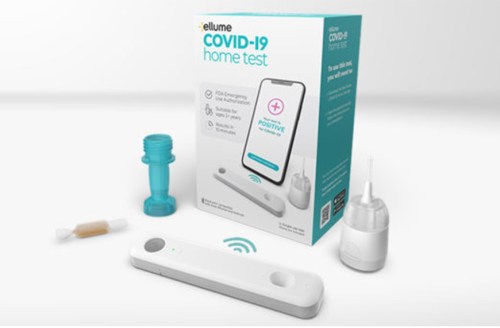New $30 At-Home Rapid COVID-19 Test Available Without a Prescription by January
The FDA gave an emergency use authorization to a rapid at-home COVID-19 test that will be available to purchase in pharmacies as soon as early January.

On Tuesday, the Food and Drug Administration granted an emergency use authorization to a new at-home diagnostic COVID-19 test. The rapid antigen test, created by digital diagnostics company Ellume, delivers results in as little as 15 minutes. Such a speedy result is exactly what we need right now, says Andrew T. Chan, MD, MPH, a professor of medicine at Harvard Medical School and Massachusetts General Hospital. “The more rapid the turnaround, the better the test,” he says.
Experts in This Article
professor of medicine at Harvard Medical School
infectious disease epidemiologist and public health professor at the University of Nevada, Las Vegas
The test kit—available without a prescription at a cost of about $30—includes a sterile nasal swab, a dropper, processing fluid, and a Bluetooth-connected analyzer. Following video instructions on the free dedicated app, the user swabs their nose and runs the test. In 15 minutes or less, they’ll be able to view their results on their phone. It’s cleared for use in those age 2 and older.
Production of Ellume’s test is well underway and producers plan to deliver 20 million tests to the United States within the first half of 2021, making it available to purchase in pharmacies throughout the country as soon as early January. (This comes on the heels of the authorization of an at-home diagnostic COVID-19 test that requires a prescription.)

The Ellume test uses technology that has been in production for over 10 years. It’s a rapid antigen test, which is less accurate than molecular tests like PCR tests. But Dr. Chan says its could be a game-changer even if it’s not as accurate as a PCR.
“One of the real advantages of this test is that it is a rapid test,” says Dr. Chan. “It’s pretty difficult to have testing happen with a delay in delivering results back to people because that period of delay is really time lost in which we can help prevent that person from spreading the infection to other people. There is some compromise when a test isn’t as sensitive. But testing that helps provide more information is better than no testing.”
If you have symptoms and test positive on an antigen test or have no symptoms and test negative, you can be pretty sure that your results are accurate, says Brian Labus, PhD, MPH, an infectious disease epidemiologist and public health professor at the University of Nevada, Las Vegas. Things get murky when you test negative and have symptoms or test positive and have no symptoms. In those cases where the results don’t align with the real-life context, the Centers for Disease Control and Prevention (CDC) recommends confirming your rapid antigen test results with a PCR.
If you have no symptoms and are very low risk (i.e., community spread is low in your area, you spend most of your time at home, you haven’t been exposed to a confirmed case, etc.), Dr. Chan says you may be better off foregoing a test. If you fall into that bucket and you do test positive, “it’s more likely that test result is a false positive,” he says.
Another advantage of Ellume’s rapid COVID-19 test is that the Bluetooth functionality allows it to provide real-time reporting of test results to health authorities through contact tracing. The app requires people to input their zip code and date of birth, with optional fields including name and e-mail address, and reports the results to public health authorities to monitor disease prevalence. “It is really important to be able to track testing in communities so you can know what proportion of the community is testing positive,” says Dr. Chan, who is conducting a COVID-19 study you can join on your phone.
Even with these new technologies and a COVID-19 vaccine in the early stages of circulation, precautions like wearing masks and maintaining social distance remain essential to public health.
“Testing gives you a snapshot at a single point in time. You may test negative today, but you’re incubating the disease and could be positive tomorrow. That’s why we’re still wearing the masks” says Dr. Labus. “Right after you got tested, you [you could be] exposed to somebody and a few days later you’ll be able to spread it. That test just tells you you are negative at a certain time.”
Listen to a biochemist explain how vaccines work:
Sign Up for Our Daily Newsletter
Get all the latest in wellness, trends, food, fitness, beauty, and more delivered right to your inbox.
Got it, you've been added to our email list.










